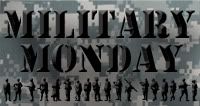Happy Monday everyone! I hope you all had a wonderful weekend and are looking forward to a new week. This week's installment of Military Monday is all about basic combat training (BCT). If you are unfamiliar with Military Monday, head on over to
5 Nuts in a Nutshell for more information.
After someone enlists in the military, they go to BCT. (Every branch's training is slightly different. Since my husband is in the army, that is what I will be writing about.) My husband started BCT in May of 2010, three weeks after we got married. Because I was so unfamiliar with the military, this was a very overwhelming and sometimes discouraging time for me. The first two weeks was the hardest for I was adjusting to living by myself. I had moved to a new apartment and didn't know any of my neighbors. I was living in the same college town but all of my friends were gone for the summer. I had no children to force me to get up and keep my normal schedule and it was discouraging for me. So I chose to focus my energy on learning everything I could about the military so my husband would be pleased with me when he got home. (He was very impressed.) I searched countless websites, blogs, Facebook pages, etc. for information, support and encouragement. If you're new to the military lifestyle (particularly the Army), here are some of my favorites:
Household 6 Diva- a blog by an army wife stationed in Germany, and
HouseHold6 -Army Wife Basic Training. Sometimes the BCT unit also has a Facebook page where you can ask questions and have them answered by a member of the cadre. (My husband's did for a while but has since been discontinued.)
I have lots of advice for spouses who have to say goodbye to their loved one leaving for basic training.
First, I like to tell people to take time to grieve. The adjustment can be overwhelming and it is important to allow yourself time to sort through the emotions you're feeling. It's okay to feel sad, lonely, angry, and discouraged at times and it's alright to take time to sort through those feelings as long as you pick yourself up afterwards and continue forward.
Next, don't expect a lot of phone calls. My husband and I got the impression that he would be able to call once a week. However, we soon learned that this wouldn't be the case. Phone calls are a privilege that can easily be taken away. When one soldier disobeys, he can lose phone privileges for the entire platoon. Don't expect them to happen often but cherish them when they do.
Next, write letters. My husband is a letter writer and I was fortunate to receive letters from him regularly. Soldiers are supposed to have some free time before bed (not much but some) and it was a priority and therapeutic for my husband to write me for a few minutes before he went to sleep. However, some may not write much. It is important to be understanding and realize that basic is exhausting and soldiers don't have much free time.
Be supportive. Many people would say not to talk or write about how sad/angry/discouraged you are at their absence. They need to focus on their training so they can finish and graduate and go on with their next phase of training. I liked to think that by being encouraging and positive and supportive when I talk to him will bring him home faster because he won't be worried about how things are going at home.
Lastly, if it is possible, I strongly encourage you to go to graduation. I went and it totally changed my perspective on our military lifestyle. Instead of thinking about how long it will be until my husband can get out, I became proud of him and his choice to join the army. By graduation, your spouse has worked very hard to get where he is and by attending, you are showing your support and love for him. Plus, you get to see him before he goes onto the next phase of his training and you get happy moments like this:

After BCT, a soldier goes onto advanced individual training. This is where he gets trained on his MOS (military occupation specialties), in other words, his job in the military. The length of this training depends on what job he chooses. Because my husband's career goal is to be a JAG (something he has to go to law school in order to do) he chose the shortest MOS possible because he would just be changing it later. SO his training was only six weeks long. AIT was a piece of cake compared to BCT. We talked on the phone almost every night and it was towards the end so it actually went rather quickly.
Wow, this was a long post. I didn't realize I had so much to say about basic combat training. Do you have your own experience with basic training? Click on the button below to head on over to 5 Nuts in a Nutshell to join the fun!










